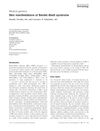Comparison of Fatty Liver Disease in Men with and without Androgenetic Alopecia
March 2021
in “
Journal of Babol University of Medical Sciences
”

TLDR Men with androgenetic alopecia (hair loss) are more likely to have fatty liver disease than those without hair loss.
The study "Comparison of Fatty Liver Disease in Men with and without Androgenetic Alopecia" involved 140 men aged 25 to 55 years, with 70 men in two groups of men with and without androgenetic alopecia. The study found that 77.1% of men with androgenetic alopecia had fatty liver disease, compared to 58.6% of men without androgenetic alopecia, a significant difference (p=0.019). Grade one and three fatty liver was significantly higher in patients with androgenetic alopecia compared to the group without androgenetic alopecia (p=0.011). There was no significant relationship between the grade of fatty liver and the extent of androgenetic alopecia (p=0.059), but the extent of hair loss in obese individuals was significantly higher (p<0.001). The study concluded that fatty liver disease has a significant frequency in men with androgenetic alopecia.




